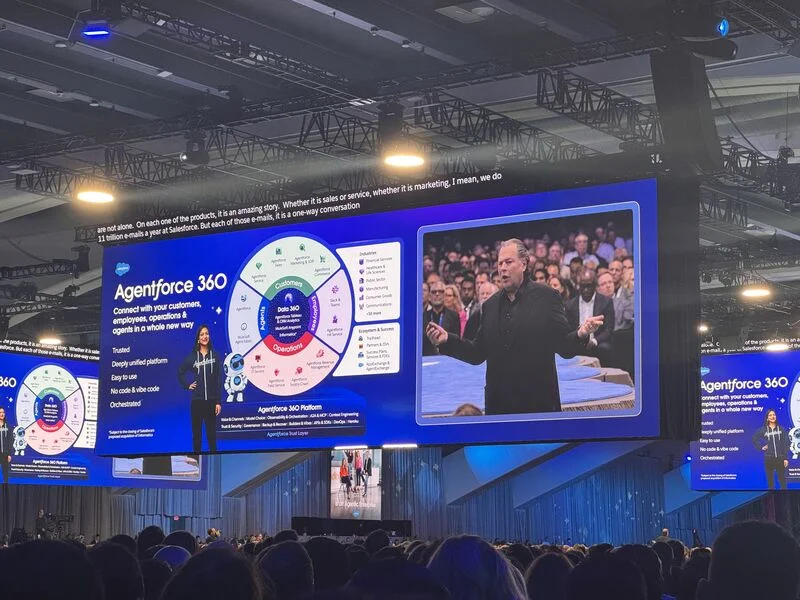
How to Stand Out on the Salesforce Contract Market
27 Jun, 20233 minWhile the nature of the Salesforce contract market varies depending on what area of the CRM ...

While the nature of the Salesforce contract market varies depending on what area of the CRM platform you work in, a general trend is emerging; candidates are receiving fewer contract offers than they were this time last year. This striking trend is forcing those who prefer contract work to ask whether they should start looking for permanent positions, take a break from work to do more certifications, or even look at remote options in a different country.
Not only is economic uncertainty shaking up the Salesforce contract market, but so too is the rise in the number of applications from remote workers in other countries, and because of this, there is increased competition for contract work. Freelancing has always been the best way for specialists in IT to maximise their earnings, and this is not about to change. What is changing is how we are now able to do our work remotely anywhere in the world. This could make it hard for some in the short term, but it will open up opportunities for everyone in the long run.
But for now, it’s crucial to consider how to make yourself stand out in Salesforce’s ever-more competitive contract landscape. In this guide, we will explore the 5 top tips for finding success in Salesforce contract work, and look at the benefits and drawbacks of being a Salesforce contractor.
Top Tips For Success in Salesforce Contract Work
At MA, we know the difficulties of finding high-quality contract work in the current climate. While finding meaningful contract roles can be challenging, it is by no means impossible, and there are various ways you can make yourself all the more appealing to hiring managers. Here are some useful pointers:
1. Network
The networking you should be doing is what can really help at times like this, so consistent networking is key. Contract work can come from anywhere, and you would be surprised who could be interested in your services. Keeping consistent in your networking will keep you top of mind in the ecosystem, and when people start looking for a contractor, they can easily find you. There are plenty of places where you can network, including social media platforms, Salesforce’s AppExchange marketplace, and local group events for fellow Salesforce professionals.
2. Demonstrate Your Value
As a Salesforce contractor, it is essential to be upfront about your experiences and achievements, so be sure to make your clients aware of the wins you’ve had over your career. Remember, your clients come to you for your expertise in the world of Salesforce consultancy, and you should have the confidence to tell them why you are the ideal consultant for their business. If you have a profile on AppExchange, you could use the platform to share positive testimonials and examples of your previous successes.
3. Specialise in a Niche Area
Specialising in a particular area that’s in need of Salesforce talent may just be the right way for you to stand out from the crowd. Carving out a reputation by focusing on a niche area of knowledge can be highly profitable, as clients looking for particular expertise are more likely to avail of your services. Which area you choose to specialise in ultimately depends on your own unique talents. For example, if you are an expert in helping clients optimise their sales processes, you may choose to specialise in using Salesforce Sales Cloud. Alternatively, if you are better at supporting businesses who are new to the platform, you could make Salesforce implementation your featured skill.
4. Be Adaptable
When seeking out your next contract role, it’s important to keep an open mind about what you should pursue. Be sure to broaden your horizons and look out for opportunities in areas that allow you to gain valuable experience. For example, if you feel that your understanding of the Sales Cloud functionality could be improved, helping a client with a cloud-related project may be the best method of enhancing your understanding of the topic. Learning through experience and exposing yourself to new challenges are effective ways to diversify your skill set and ready yourself for any Salesforce consultant contract work.
5. Stay On Top of Your Salesforce Knowledge
At some point in your career as a Salesforce contractor, the chances are that you’ll experience a gap between jobs at some point. Of course, your top priority during these out-of-work periods will be to apply for your next position, but it’s also essential that you make the most of times like these to maximise your knowledge of the platform. Be sure to take as many certifications on Trailhead as you can, as this demonstrates to future employers that you are committed to boosting your Salesforce career and are always willing to expand your knowledge.
Are you looking for the latest Salesforce contract jobs? At MA, we will go above and beyond to support your recruitment needs. You can check out all of the latest roles here.
Advantages and Disadvantages of Salesforce Contract Work
There are numerous pros and cons of Salesforce contract work, and at times when attractive contract projects are few and far between, it is the ideal time to take stock and assess whether being a contractor is the right route for you. While many prefer the versatility and higher earnings of contract work, others value the job security and employee benefits of permanent employment more. If you’re considering whether to continue your contracting career, reminding yourself of the benefits and pitfalls is an important step. Let’s start with the advantages of Salesforce contracting.
3 Advantages of Salesforce Contract Work
As we established earlier, the Salesforce contract scene is becoming all the more competitive. But why is this so? Well, there are numerous reasons why so many Salesforce professionals are opting for this style of working, and here are 3 of the key advantages:
1. Higher Earning Potential
While a permanent position may offer a steady and stable annual income, contract roles are often even more lucrative. To get an idea of why this is the case, let’s do some number crunching. The typical daily rate for a Salesforce consultant contractor is £550, while the average annual salary for the same position is £57,341.
So, if you opt for the contractor route and work the same hours as someone in a salaried position, you could earn significantly more. For instance, a Contract Salesforce Administrator can earn up to £84,000, a higher sum than their permanently employed counterparts. Companies hire Salesforce professionals on a contractual basis because they need their expertise to solve business problems, and the comparatively high financial remuneration reflects that.
2. Flexibility
As a Salesforce contractor, you can be much more flexible with the work you choose to take on. If you are working on a particular project that isn’t fulfilling you or adding value to your career, you can rest easy knowing that you can swiftly move on once your contract expires. Not only can you enjoy a versatile range of tasks, but you can also have more flexibility with where you work. Rather than being stuck to one office or location, you have the opportunity to work from home and travel around the country or even abroad.
3. Opportunity to Broaden Your Experience
A downside of permanent roles is that they tend to be somewhat repetitive, and the opportunities for partaking in brand-new challenges that allow you to utilise new skills are few and far between. Contract workers don’t have this problem, as they are commonly expected to perform a rich and varied selection of duties. Opting for Salesforce contracts will mean that you’re not pigeonholed to a single set of tasks, and you’ll also have the chance to build a wider skill set that’ll impress future employers.
3 Disadvantages of Salesforce Contract Work
Though there are a broad range of advantages that make contract work appealing, a significant amount of Salesforce workers still choose to stick with the permanent employment route. Let’s take a look at some of the leading factors that convince people to avoid contract jobs.
1. Lack of Employee Benefits
One of the biggest drawbacks of Salesforce contract jobs is that they don’t come with the sort of benefits enjoyed by staff in permanent roles. Perks such as paid sick leave, holidays, and insurance benefits aren’t usually offered to contract employees. There are no strict rules barring contract workers from these sorts of perks, but businesses typically hire contract staff purely for business purposes. Despite this, you may find that the advantages of not being tied down to one company outweigh the lack of employee benefits.
2. Career Development Challenges
If you work at an organisation on a permanent basis, you’ll likely follow a set career pathway. Traditional career progression structures are not afforded to contract workers, largely because they are employed on a short-term basis and jump from one business to the next. Rather than relying on others to vouch for their abilities when it comes to promotion cycles, they have to carve out their own reputations. It is also fairly common for companies to invest in their permanent Salesforce staff by paying for their training and certifications, whereas contractors have to self-fund their qualifications.
3. Less Job Security
One of the main reasons why some Salesforce professionals opt for permanent roles is the higher job security. That’s not to say that contract work offers no security at all. However, those in permanent employment can guarantee that they’ll receive a steady flow of income, while contractors can’t be certain if they’ll immediately get more work after their current contract expires. Ultimately, what contract workers lack in perceived job security, they more than makeup for in freedom of choice and higher earning potential.
The Salesforce contract market is experiencing significant shifts due to economic uncertainty and increased competition from remote workers globally. However, with the right strategies, success in Salesforce contract work is still achievable. Consistent networking, staying active in your craft, specializing in niche areas, being adaptable, and staying updated with Salesforce knowledge are key to standing out in the competitive landscape.
While Salesforce contract work offers higher earning potential, flexibility, and opportunities for diverse experiences, it also comes with disadvantages like the lack of employee benefits, career development challenges, and less job security compared to permanent roles. Deciding between contract and permanent employment depends on individual preferences and priorities.
Navigating the Salesforce contract market may require careful consideration, but with dedication and a focus on continuous growth, professionals can find meaningful and rewarding opportunities in this ever-evolving landscape.
Learn More About Our Expertise in Salesforce Recruitment
If you’re already freelancing and considering specialisation or considering the contract market, read my recent article. Learn more about our work in Salesforce or reach out to me directly, I’d be happy to talk through some options with you.


